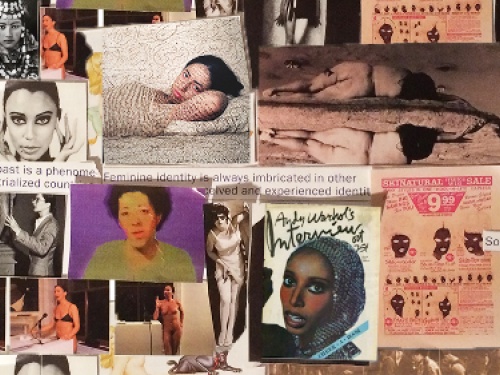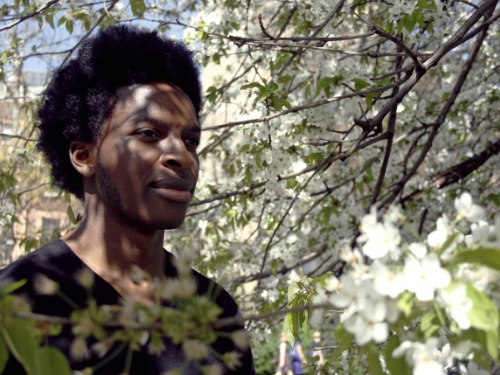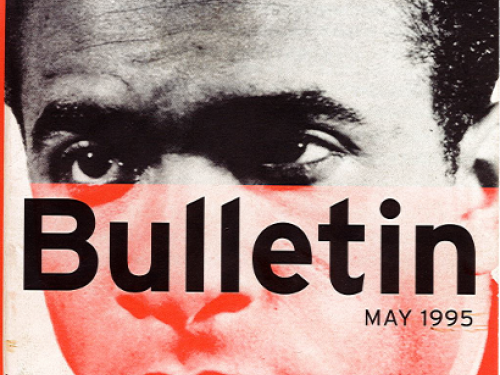Sounding Dark
It Goes Without Saying
On 9 September our Friday Salon: Sounding Dark will examine Western culture's historical fascination with black voices. The panel will explore the impact of presumptions of black voice on black bodies, and how voice is racialised and marketed across music, film, culture and politics.
Ahead of the event, panellist Tristam Adams writes about the inherent assumptions of race and gender involved in the way we speak about voice.
What is it to ‘sound dark’? What is it to ‘sound black’? Such terms highlight the unhelpful assumptions about race that are at the core of how many talk about voice. These questions also betray a shortcoming of language and a prejudice of audition. To be clear, calling a voice ‘dark’ or ‘black’ makes no categorical sense. Voices cannot be judged in visual terms, yet ways of talking about voice and sound make this slip all the time. This is part of a continuum of ways we project our own assumptions about ethnicity, gender, texture and appearance onto the voice.
For example, a sound or voice may ‘sound’ bright. Similarly, one can wear a ‘loud’ shirt, and a voice can sound ‘rough'; timbre has texture. Yet how can something sound bright? How can something sound rough? We describe sonic objects as visible and tactile things, and even the most cursory survey of literature reveals that the West tends to describe sounds in terms more suited to the eye.
Even the most cursory survey of literature reveals that the West tends to describe sounds in terms more suited to the eye.
To take such categorical bungling a step further, we might say of someone who we like that their voice ‘sounds hot’. Of course, ‘hot’ here refers to desirability, not temperature, and it is a subjective reference to a subjective assumption – the voice-owner is imagined as ‘hot’ by the listener. But while we accept that one person’s idea of ‘hotness’ is different to another’s, we also tend to take the same leap of logic with more objective terms.
‘Male voice’ is one example. During puberty the male larynx tends to develop more than the female, resulting in a drop of around an octave for men but just a few notes for most women. By adulthood most men’s vocal folds are 17-25mm in length whereas most women’s vocal folds are 12.5-17.5mm. But vocal fold length is not the sole basis of voice. Vocal tract length, mouth size and shape, sinuses and umpteen other factors all modulate voice, and thus gendering a voice on the basis of pitch alone is a mistakenly assumptive enterprise, as anyone who has worked in the acousmatic matrix of a call centre would attest. Put simply, because men and women vocalize in exactly the same way there is no such thing as a ‘male voice’. It is an oxymoron, just like ‘loud shirt’. Nonetheless, when we answer a phone call, we’ll make an assumption about gender on voice alone. This may not be based on pitch or tone; it could be based, half consciously, on subtle inflections and rhythms, or the added timbre that our mouths and sinuses add to the mix. Joanna Lumley’s voice is a good example of how pitch alone doesn’t signal gender to us; hers is a deep but supposedly very ‘feminine’ voice. Following this logic, impersonators are notable for their ability to mimic both male and female voices – their gendered body doesn’t appear to hold them back. Unlike such virtuosic copycats, we have little control over our voices. Seeing as our physiology has merely a tenuous impact on our voice, we should accept that our degree of vocal engendering is largely out of our control – just like the accents, dialects, inflections and phrases we inadvertently pick up along our way.
Our voices are kaleidoscopic echoes of historical interactions and influences.
In much the same way, there is no race in voice either, only the race we project when we make culturally subjective assumptions about language, dialect, accent and pitch. We all vocalize in the same way—voice itself has no race or colour—but voice is often described as ‘black’. Talent show judges tiptoe around this assumption embarrassingly, substituting ‘black’ for terms like ‘soulful’ or ‘street’, revealing the lazy and all too common associations between blackness and impoverishment, but this will always be an assumption, a leap of logic. Within voice, an accent or dialect is not a sure basis for assuming the type of body it emanates from. It might be tempting to guess or assume the ethnicity of the speaker of Jamaican Patois, but language and voice knows no borders – national, racial, gendered or otherwise. William S. Burroughs said that ‘language is a virus’ but the way we deliver language (voice) is subject to contagion too. We have scant agency over which inflections infect our voice. Our past haunts our voice, yet such past is not gendered or racial. Our voices are kaleidoscopic echoes of historical interactions and influences. Voice comes from our body without ever being connected to our body. Not only is voice raceless and genderless by virtue of categorical definition, but also because our voices are more a reflection of the historical rather than the corporeal.
We all liken the sounds we hear to our subjective past experience, and may well suspend judgment when voices are described in visual, tactile, gendered or racial terms. But next time a voice is described in terms of ethnicity or gender perhaps we should remember that the descriptor is more about the listener’s background, assumptions and subjectivity than it is about the voice or its owner’s body. And when describing voice, instead of opting for visual terms or those related to stereotypes, we should seek a method of just talking about voice – and nothing more. ■
Friday Salon: Sounding Dark is on 9 September at 2pm.
Tristam Adams is a theorist, writer and PhD candidate at Goldsmiths College, University of London (Visual Cultures Department). His first book, The Psychopath Factory: How Capitalism Organises Empathy, will be published in December by Repeater Books. He is currently writing his PhD thesis exploring the relations between voice and horror. He blogs about theory and writes short stories.
This article is posted in: Articles, Blog, Events
Tagged with: Voice, Race, Gender, Male Voice, Sounding Dark, Racism, Culture, Tristam Adams






